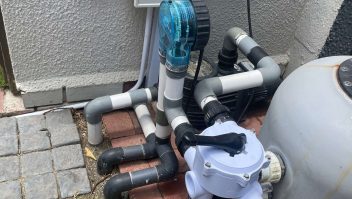Pool Pump Size Calculator: What Size Pump Do You Need?
Choosing the right pool pump is essential for maintaining a clean and healthy pool. A pump that is too small may struggle to filter the water efficiently, while one that is too large can waste energy and increase operating costs. The Pool Pump Size Calculator helps you determine the correct size pump based on your pool’s volume, shape, and desired flow rate.
Why Pool Pump Size Matters
A properly sized pool pump ensures that your pool’s water is circulated and filtered efficiently, reducing the buildup of debris and preventing water quality issues. If your pump is too small, it won’t be able to circulate the water thoroughly, leaving certain areas of the pool dirty and potentially unsafe. On the other hand, an oversized pump can cause excessive energy consumption and wear on the system, resulting in higher operational costs.
Pool Pump Size Basics
- Flow rate: The rate at which water is moved through your pool filter. Typically measured in litres per minute (LPM) or gallons per minute (GPM).
- Pump efficiency: The efficiency of the pump in terms of energy use.
- Pool volume: The total volume of water in your pool, measured in litres.
How to Use the Pool Pump Size Calculator
To calculate the ideal pool pump size, you’ll need the following information:
- Pool volume in litres: The total amount of water in your pool.
- Desired turnover rate: The time it takes for the pump to filter the entire volume of your pool’s water (typically 8 hours or one full turnover per day).
- Desired flow rate: The speed at which the pump needs to circulate the water to maintain cleanliness. This is typically measured in litres per minute or gallons per minute.
Once you input these details into the Pool Pump Size Calculator, the tool will recommend the best pump size for your pool.
Sample Calculation
For a pool with a 50,000L volume and a desired turnover rate of 8 hours:
- Turnover rate: 50,000L / 8 hours = 6,250L per hour
- Flow rate: 6,250L / 60 minutes = 104.17L per minute
In this case, the pump size should be able to move about 104L per minute.
Pool Pump Selection Tips
- Consider pool type: Pools with features like waterfalls, fountains, or a spa may require a larger pump to ensure proper water circulation.
- Energy efficiency: Look for energy-efficient pumps that use variable speed technology to help lower energy costs.
- Maintenance: Always maintain your pump by checking filters and impellers regularly to ensure it is operating efficiently.
Internal Links
External Links
FAQ Section
1. What happens if my pool pump is too small?
A small pump will struggle to circulate the water, leaving areas of your pool dirty and possibly leading to algae growth and other water quality issues.
2. Can I use a larger pump than needed?
While a larger pump can circulate water faster, it can waste energy, leading to higher utility bills. Always aim for the appropriate size based on your pool’s volume and features.
3. How can I tell if my pump is too large?
If your pump is too large, it will be louder than normal, use more energy, and may cause excessive wear on the pool filter and equipment.
4. What is the best flow rate for my pool?
The ideal flow rate depends on your pool’s volume and desired turnover time. For most pools, a flow rate that allows for a complete turnover within 8 hours is recommended.
5. How often should I replace my pool pump?
Pool pumps generally last between 8–10 years. However, if your pump is inefficient, making unusual noises, or requiring frequent repairs, it may be time to replace it sooner.
By ensuring your pool pump is the correct size, you can maintain a clean, healthy pool without unnecessary energy consumption. Use the Pool Pump Size Calculator to make an informed decision, and if you need expert advice, feel free to contact Pools Reno for personalized recommendations!



